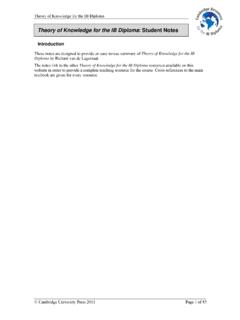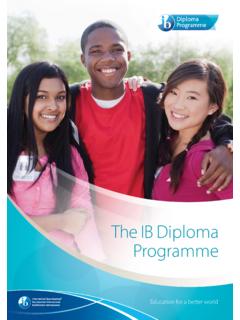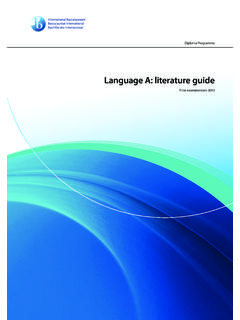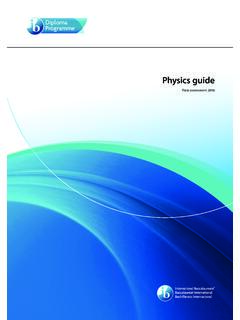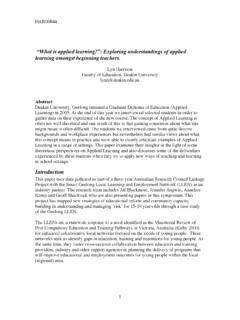Transcription of Theory of knowledge guide - Holy Heart of Mary High School
1 Theory of knowledge guideFirst assessment 2015 Theory of knowledge guideFirst assessment 2015DR51 diploma ProgrammeTheory of knowledge guidePublished April 2013 Published on behalf of the International Baccalaureate Organization, a not-for-profit educational foundation of 15 Route des Morillons, 1218 Le Grand-Saconnex, Geneva, Switzerland by theInternational Baccalaureate Organization (UK) LtdPeterson House, Malthouse Avenue, Cardiff GateCardiff, Wales CF23 8 GLUnited KingdomWebsite: International Baccalaureate Organization 2013 The International Baccalaureate Organization (known as the IB) offers four high-quality and challenging educational programmes for a worldwide community of schools, aiming to create a better, more peaceful world. This publication is one of a range of materials produced to support these IB may use a variety of sources in its work and checks information to verify accuracy and authenticity, particularly when using community-based knowledge sources such as Wikipedia.
2 The IB respects the principles of intellectual property and makes strenuous efforts to identify and obtain permission before publication from rights holders of all copyright material used. The IB is grateful for permissions received for material used in this publication and will be pleased to correct any errors or omissions at the earliest rights reserved. No part of this publication may be reproduced, stored in a retrieval system, or transmitted, in any form or by any means, without the prior written permission of the IB, or as expressly permitted by law or by the IB s own rules and policy. See merchandise and publications can be purchased through the IB store at General ordering queries should be directed to the Sales and Marketing Department in : Baccalaureate, Baccalaur at International and Bachillerato Internacional are registered trademarks of the International Baccalaureate in the United Kingdom by Antony Rowe Ltd, Chippenham, WiltshireIB mission statementThe International Baccalaureate aims to develop inquiring, knowledgeable and caring young people who help to create a better and more peaceful world through intercultural understanding and this end the organization works with schools, governments and international organizations to develop challenging programmes of international education and rigorous programmes encourage students across the world to become active, compassionate and lifelong learners who understand that other people, with their differences, can also be right.
3 IB learner profileThe aim of all IB programmes is to develop internationally minded people who, recognizing their common humanity and shared guardianship of the planet, help to create a better and more peaceful world. IB learners strive to be:InquirersThey develop their natural curiosity. They acquire the skills necessary to conduct inquiry and research and show independence in learning. They actively enjoy learning and this love of learning will be sustained throughout their explore concepts, ideas and issues that have local and global significance. In so doing, they acquire in-depth knowledge and develop understanding across a broad and balanced range of exercise initiative in applying thinking skills critically and creatively to recognize and approach complex problems, and make reasoned, ethical understand and express ideas and information confidently and creatively in more than one language and in a variety of modes of communication. They work effectively and willingly in collaboration with act with integrity and honesty, with a strong sense of fairness, justice and respect for the dignity of the individual, groups and communities.
4 They take responsibility for their own actions and the consequences that accompany understand and appreciate their own cultures and personal histories, and are open to the perspectives, values and traditions of other individuals and communities. They are accustomed to seeking and evaluating a range of points of view, and are willing to grow from the show empathy, compassion and respect towards the needs and feelings of others. They have a personal commitment to service, and act to make a positive difference to the lives of others and to the approach unfamiliar situations and uncertainty with courage and forethought, and have the independence of spirit to explore new roles, ideas and strategies. They are brave and articulate in defending their understand the importance of intellectual, physical and emotional balance to achieve personal well-being for themselves and others. ReflectiveThey give thoughtful consideration to their own learning and experience.
5 They are able to assess and understand their strengths and limitations in order to support their learning and personal development. International Baccalaureate Organization 2007 Theory of knowledge guideContentsIntroduction 1 Purpose of this document 1 The diploma Programme 2 Coherence in the core 4 TOK and the learner profile attributes 6 TOK at a glance 8 Nature of the subject 10 Aims 14 Assessment objectives 15 Syllabus 16 knowledge in TOK 16 knowledge claims and knowledge questions 20 Ways of knowing 23 Areas of knowledge 28 Assessment 50 Assessment in the diploma Programme 50 Assessment outline 51 Assessment details 52 Assessment instruments 59 Theory of knowledge guide11 IntroductionPurpose of this documentThis publication is intended to guide the planning, teaching and assessment of Theory of knowledge (TOK) in schools. TOK teachers are the primary audience, although it is expected that teachers will use the guide to inform students and parents about the guide can be found on the TOK page of the online curriculum centre (OCC) at , a password-protected IB website designed to support IB teachers.
6 It can also be purchased from the IB store at are not obliged to follow the suggested examples and ideas presented here; this guide offers a framework rather than prescribed content. Teachers should consider the examples and ideas provided and then construct their own unique TOK course around key TOK concepts that include, but are not limited to, the nature of knowledge , ways of knowing and areas of knowledge . When designing a TOK course, teachers must above all consider the aims and objectives of guide is to be read in conjunction with the teacher support material (TSM) available on the OCC which will help teachers design a TOK resourcesAdditional resources such as subject reports, assessment exemplars, past prescribed essay titles and sample TOK presentations can also be found on the OCC. Teachers are encouraged to check the OCC for additional resources created or used by other teachers. Teachers can provide details of useful resources, for example: websites, books, videos, journals or teaching IB wishes to thank the educators and associated schools for generously contributing time and resources to the production of this assessment 2015 Theory of knowledge guide22 IntroductionThe diploma ProgrammeThe diploma Programme is a rigorous pre-university course of study designed for students in the 16 to 19 age range.
7 It is a broad-based two-year course that aims to encourage students to be knowledgeable and inquiring, but also caring and compassionate. There is a strong emphasis on encouraging students to develop intercultural understanding, open-mindedness, and the attitudes necessary for them to respect and evaluate a range of points of diploma ProgrammeThe course is presented as six academic areas enclosing a central core (see figure 1). It encourages the concurrent study of a broad range of academic areas. Students study: two modern languages (or a modern language and a classical language); a humanities or social science subject; an experimental science; mathematics; one of the creative arts. It is this comprehensive range of subjects that makes the diploma Programme a demanding course of study designed to prepare students effectively for university entrance. In each of the academic areas students have flexibility in making their choices, which means they can choose subjects that particularly interest them and that they may wish to study further at 1 diploma Programme modelThe diploma ProgrammeTheory of knowledge guide3 Choosing the right combinationStudents are required to choose one subject from each of the six academic areas, although they can choose a second subject from groups 1 to 5 instead of a group 6 subject.
8 Normally, three subjects (and not more than four) are taken at higher level (HL), and the others are taken at standard level (SL). The IB recommends 240 teaching hours for HL subjects and 150 hours for SL. Subjects at HL are studied in greater depth and breadth than at both levels, many skills are developed, especially those of critical thinking and analysis. At the end of the course, students abilities are measured by means of external assessment. Many subjects contain some element of coursework assessed by teachers. The courses are available for examinations in English, French and Spanish, with the exception of groups 1 and 2 courses where examinations are in the language of study. Special educational needsSchools must ensure that equal access arrangements and reasonable adjustments are provided to candidates with special educational needs that are in line with the IB documents Candidates with special assessment needs and Special educational needs within the International Baccalaureate core of the programme modelAll diploma Programme students participate in the three elements that make up the core of the programme model.
9 Reflection on all these elements is a principle that lies at the Heart of the thinking behind the diploma Theory of knowledge course encourages students to think about the nature of knowledge , to reflect on the process of learning in all the subjects they study as part of their diploma Programme course, and to make connections across them. The extended essay, a substantial piece of writing of up to 4,000 words, enables students to investigate a topic of special interest that they have chosen themselves. It also encourages them to develop the skills of independent research that will be expected at university. Creativity, action, service (CAS) involves students in experiential learning through a range of artistic, sporting, physical and service of knowledge guide44 Coherence in the coreIntroductionThe three elements of the core (TOK, CAS and the extended essay) were introduced by the original curriculum designers of the diploma Programme as a way to educate the whole person.
10 The core consists of three separate elements, but links and relationships are evident between them even if these links have not previously been clearly committed to the principle of developing the whole person, the IB believes that this is best achieved by identifying and developing clearer and more explicit aims for and relationships between TOK, CAS and the extended essay. Specifically, the IB believes a coherent view of the core will: support the interconnectedness of learning support concurrency of learning support the IB continuum of education and the learner profile support a broader view of the subject does not mean similarity. Coherence in this context refers to the three elements of the core complementing each other and working together to achieve common aims. All three elements of the core should be grounded in three coherent aims: to support, and be supported by, the academic disciplines to foster international-mindedness to develop self-awareness and a sense of , and being supported by, the academic disciplinesThe core is seen as the Heart of the diploma Programme.


